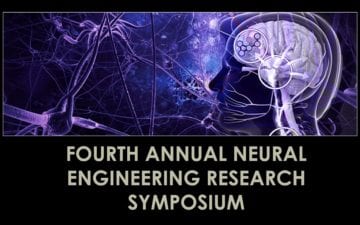(November 2020) The Institute for Neural Engineering at the University of Miami hosted more than 200 neuroscientists and biomedical engineers from leading institutions across the State of Florida during the virtually-held 4th Neural Engineering Research Symposium on October 26th and 27th of 2020. The Symposium highlighted ongoing and planned breakthrough translational neuroscience and neurotechnology development research and provided a platform for our trainees and researchers to communicate their work by engaging with researchers at the University of Florida, Florida International University, Florida Atlantic University, Max Planck Florida Institute for Neuroscience, Scripps Florida, University of South Florida and Florida State University.
The Symposium featured presentations on Novel Tools and Techniques in Neuroscience, Computational Neuroscience, recent advances and future potential of Brain-Computer Interfaces, and a robust discussion on the emerging understanding of the Aging Brain. W. Dalton Dietrich, III, Ph.D., Scientific Director, The Miami Project; Kinetic Concepts Distinguished Chair in Neurosurgery; Senior Associate Dean for Discovery Science; Co-Director, Institute for Neural Engineering; Professor, Neurological Surgery, Neurology, Biomedical Engineering and Cell Biology, discussed the unique opportunities that the Symposium presents. “The Symposium allows our scientists to build alliances to attack highly complex clinical problems in our field including stroke, paralysis, aging, cognition and a multitude of sensory deficits. It was exciting to hear about different approaches that basic scientists, engineers, and physicians are using to improve overall brain health.”
A thrust in the neural engineering field, and a major focus of the Institute, is to bring biomedical engineers and neuroscientists together to develop new technologies, new diagnostics, rehabilitation, and therapies to benefit patients. The Institute also has a mission to educate and train the next generation of neural engineers who will continue to build upon the successes achieved thus far.
Suhrud Rajguru, Ph.D., Associate Professor of Biomedical Engineering and Otolaryngology at the College of Engineering, who co-directs the Institute with Dr. Dietrich understands the role that trainees and interdisciplinary collaborations play in the scientific and clinical advances. “It is imperative that we continue to engage with researchers across the State of Florida and beyond, develop new educational efforts, and recruit researchers in this exciting field that promises a better future for patients suffering from a multitude of neurological disorders. A close collaboration between the Departments of Biomedical Engineering and the neuroscientists at the Miller School of Medicine’s Miami Project to Cure Paralysis, and others, are already advancing our understanding of these disorders.” The program concluded with 30 virtual and video poster presentations that discussed a variety of research topics from the role of oxidative stress in intracortical implants used for brain-machine interfaces, use of infrared radiation for stimulating neurons, and use of machine learning to identify novel pharmacotherapies to treat neurological disorders.
The Institute is directed by Drs. W. Dalton Dietrich and Suhrud Rajguru, and the program committee included three doctoral students at the University of Miami, Xu Pan, Hannah Radabaugh, Federica Raciti and assistant scientist, Rachele Sangaletti. The Symposium was supported by the Clinical and Translational Science Institute at Miami, The Miami Project to Cure Paralysis, Miller School of Medicine, College of Arts and Science and the College of Engineering.

